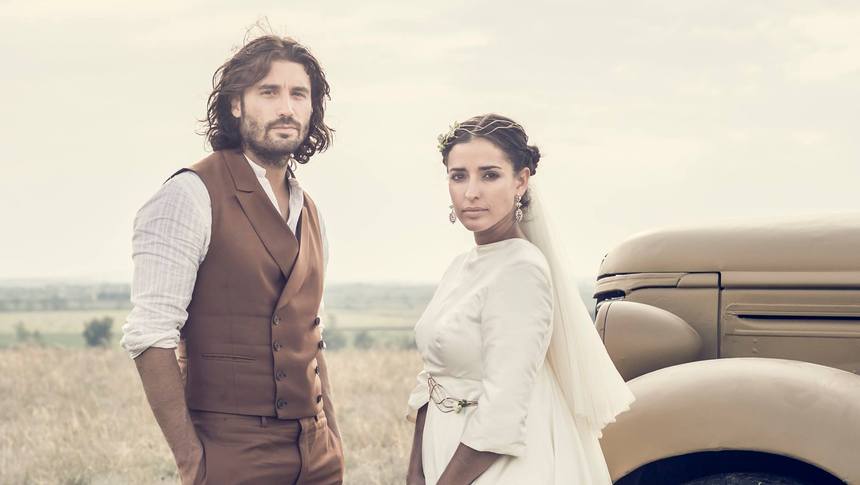Black Nights 2015 Review: THE BRIDE, Love In The Ruins

The Bride (Inma Cuesta) awaits her wedding day to The Groom (Asier Etxeandia), but in the background lurks her former lover Leonardo (Alex García), whom she spurned because of his lack of security. There is a blood feud between The Groom and Leonardo's families, and her future mother-in-law (Luisa Gavasa) is uncertain of The Bride's loyalty. As the wedding day approaches, The Bride and Leonardo find they cannot contain their passion, and it threatens to explode, ruining their and their families' lives. (Note: I haven't forgotten characters' names, most of them are not given).
Given the dialogue, which is mainly poetry, and the plot, which is intimate in nature but grand in scale, in a theatre setting it is usually performed on a large scale. But such largesse wouldn't translate well to the big screen, and Ortiz is smart enough to know this. So instead, she gives grand and gorgeously sparse landscapes, and sets her actors to turn inwards. Words are spoken directly and with purpose, and at times, almost at a whisper. This is paired with minimal sound, often just the sound of crickets, forcing the spectator to lean in and focus on the dialogue. This has the effect of pulling in the spectator, creating them as an audience in the scenery.
And what scenery. Filmed in Aragón and Turkey, Ortiz takes full advantage of the combination of forest, mountains and desert to recreate a Greek-tragedy-like space for the actors to move within. Colours are stark against the desert, washed-out so that when blood does spill, it seems both an invasion and a natural occurrence. People live in often ruined or run-down buildings, eeking out this existence where any kind God has left them to their feuds and disastrous passions.
Such an iconic play warrants strong actors, and Ortiz has selected not just for beauty but also for sensitivity and some serious training. As stated, most of the dialogue is poetry, but it must trip off the tongue as if naturally spoken. By keeping the dialogue at a natural volume for the cinema, Ortiz allows her actors to give the words the gravitas and lyricism they deserve, while still sounding as if this is how they speak every day.
Of course, it helps that the dialogue is so well written, and such poetic language might not be to everyone's taste. These are the words of love, rage and sorrow, and while the work of the older actors such as Gavasa and Carlos Alvarez-Novóa (as The Bride's father) is a given, Cuesta really stands out. This is not a silly girl who brazenly lets her heart run amok, but a young woman with the weight of the world on her shoulders, with the expectations of so many pressed upon her. Cuesta's bride has a heart in two places, and knows whatever decision she makes, she will be unhappy.
The Bride is not a subtle film, nor should it be. It wears its themes and symbols on its sleeve. This is high drama after all, but Ortiz never lets is become melodramatic nor does she shy away from letting the poetry (and blood) flow. This is an incredibly well-crafted and detailed film, with strong performances and a gorgeous setting that lets the poetry speak to the audience without reservation.
The Bride is not a subtle film, nor should it be. It wears its themes and symbols on its sleeve. This is high drama after all, but Ortiz never lets is become melodramatic nor does she shy away from letting the poetry (and blood) flow. This is an incredibly well-crafted and detailed film, with strong performances and a gorgeous setting that lets the poetry speak to the audience without reservation.

Do you feel this content is inappropriate or infringes upon your rights? Click here to report it, or see our DMCA policy.






